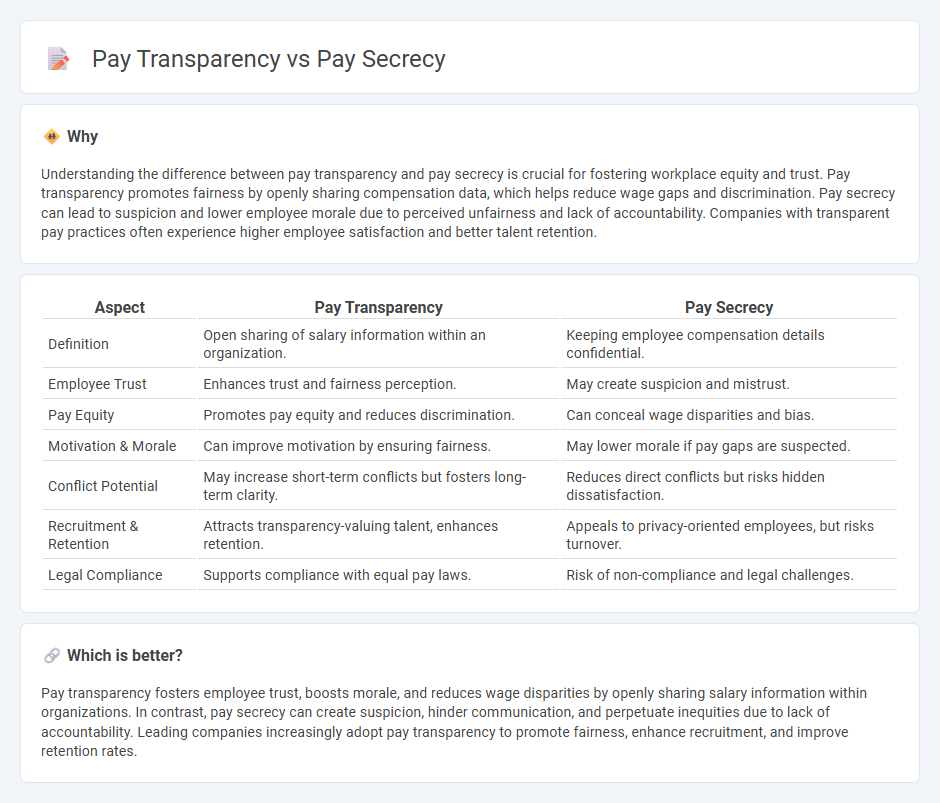
Pay transparency fosters trust and equity by openly sharing salary ranges and compensation criteria within an organization, enhancing employee motivation and retention. In contrast, pay secrecy can create uncertainty and perceived unfairness, potentially leading to decreased morale and internal conflicts. Explore how balancing these approaches can optimize workplace satisfaction and performance.
Why it is important
Understanding the difference between pay transparency and pay secrecy is crucial for fostering workplace equity and trust. Pay transparency promotes fairness by openly sharing compensation data, which helps reduce wage gaps and discrimination. Pay secrecy can lead to suspicion and lower employee morale due to perceived unfairness and lack of accountability. Companies with transparent pay practices often experience higher employee satisfaction and better talent retention.
Comparison Table
| Aspect | Pay Transparency | Pay Secrecy |
|---|---|---|
| Definition | Open sharing of salary information within an organization. | Keeping employee compensation details confidential. |
| Employee Trust | Enhances trust and fairness perception. | May create suspicion and mistrust. |
| Pay Equity | Promotes pay equity and reduces discrimination. | Can conceal wage disparities and bias. |
| Motivation & Morale | Can improve motivation by ensuring fairness. | May lower morale if pay gaps are suspected. |
| Conflict Potential | May increase short-term conflicts but fosters long-term clarity. | Reduces direct conflicts but risks hidden dissatisfaction. |
| Recruitment & Retention | Attracts transparency-valuing talent, enhances retention. | Appeals to privacy-oriented employees, but risks turnover. |
| Legal Compliance | Supports compliance with equal pay laws. | Risk of non-compliance and legal challenges. |
Which is better?
Pay transparency fosters employee trust, boosts morale, and reduces wage disparities by openly sharing salary information within organizations. In contrast, pay secrecy can create suspicion, hinder communication, and perpetuate inequities due to lack of accountability. Leading companies increasingly adopt pay transparency to promote fairness, enhance recruitment, and improve retention rates.
Connection
Pay transparency fosters trust and fairness by openly sharing salary information, which reduces wage gaps and supports employee motivation. Pay secrecy, on the other hand, can lead to misinformation, perceived inequities, and lower morale within the workforce. Balancing these practices is critical for human resources to create an equitable compensation strategy that aligns with organizational goals and legal requirements.
Key Terms
Compensation Disclosure
Pay secrecy limits employees' knowledge about compensation details, often fostering distrust and inequality in the workplace. Pay transparency, by contrast, encourages openness around salaries and bonuses, promoting fairness and employee motivation through clear compensation disclosure. Explore more about how compensation disclosure impacts organizational culture and employee performance.
Wage Equality
Pay secrecy often leads to wage inequality by concealing disparities and limiting employees' ability to negotiate fair compensation based on transparent salary data. Pay transparency promotes wage equality by providing clear information on salary ranges and criteria, empowering workers and reducing discriminatory practices. Explore how adopting pay transparency can drive equitable pay structures within your organization.
Employee Morale
Pay secrecy often leads to reduced employee morale due to perceived unfairness and mistrust, while pay transparency fosters a culture of accountability and equity, boosting motivation and engagement. Companies with transparent compensation policies attract and retain top talent by promoting openness and reducing wage gaps. Discover how implementing the right pay strategy can transform your workplace culture and enhance employee satisfaction.
Source and External Links
the Buffering Effects of the Perceptions of Pay Secrecy and ... - Pay secrecy involves policies that limit or forbid employees from discussing their wages, ranging from full transparency to complete secrecy, implemented via nondisclosure and communication bans within organizations.
Pay Secrecy Policies: That's a No-No! - Pay secrecy policies that restrict employee discussions about compensation can foster pay inequity and discrimination, despite legal protections under laws like the NLRA, which limit employer restrictions on wage discussions.
Power and Pay Secrecy - Even where pay secrecy laws exist, many employees still face pay secrecy policies, largely because of employer power that enforces and legitimizes secrecy, making such rules highly durable and enforcement difficult.
 dowidth.com
dowidth.com